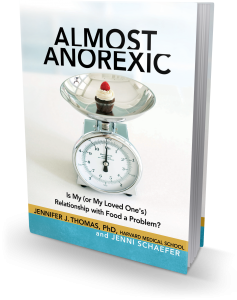 Download a PDF of the eating disorder discussion questions here.
Download a PDF of the eating disorder discussion questions here.
From the book Almost Anorexic by Jenni Schaefer and Jennifer J. Thomas, Ph.D.
Introduction:
The first line of Almost Anorexic is, “I wish I had just a touch of anorexia.” Can you relate to this statement? What do you think people mean when they say this to Jenni or to Dr. Thomas?
Chapter 1:
What does the term “almost anorexic” mean? How do you draw the line between “almost anorexic” and anorexia nervosa? What about between “almost anorexic” and normal eating?
Chapter 2:
The authors argue that individuals with almost anorexia may struggle just as much, if not more so, than those with anorexia nervosa. How do the diagnostic criteria for anorexia nervosa make this possible?
Diagnostic criteria represent clinical researchers’ best guess at defining anorexia nervosa and other eating disorders. DSM-5 recently broadened the criteria for anorexia and identified brand
new eating disorders. What further changes might you like to see when the criteria are revised again in DSM-6?
Chapter 3:
Why do you think the myth that all individuals with eating disorders are very underweight persists so strongly, despite evidence that most people with eating disorders are normal weight or overweight?
Chapter 4:
The authors argue that, these days, people don’t often like to admit when they are dieting, which can make eating disorders increasingly di!cult to detect. Why do you think so many people are currently “dieting in disguise”?
Chapter 5:
Artist Emily Wierenga created an ambiguous figure for Almost Anorexic that can be viewed as either a thin woman or a large woman. Do you see yourself as thin on some days and fat on others? What thoughts, feelings, or events (other than changes in your shape and weight) might explain these fluctuations?
Chapter 6:
The authors argue that, for some, meeting the narrow criteria for anorexia nervosa can feel like a earning a “badge of honor.” Why do you think this is?
Chapter 7:
Why do Dr. Thomas and Jenni suggest a two-stage approach to normalizing eating—starting first with external cues, and then moving on to internal cues? Where are you (or your loved one) in this process?
Chapter 8:
The authors suggest that determining whether your exercise regimen is healthy depends more on quality than quantity. Do you agree? Why or why not?
Chapter 9:
Jenni and Dr. Thomas argue that, when people struggle with almost anorexia, they may have an almost anorexic wardrobe to match. Do you relate to this concept? How so?
Chapter 10:
The authors highlight the importance of creating a circle of support in order to overcome almost anorexia and other eating disorders. How can utilizing social media platforms (e.g., Facebook, Twitter, blogs) both help and hinder recovery?
Chapter 11:
In one study, approximately one third of women who formerly met criteria for anorexia nervosa told researchers that they did not think that full recovery was possible. Jenni and Dr. Thomas argue that settling for “almost recovered” can create a self-fulfilling prophecy. What do you think?
In the book’s final chapter, the authors encourage you to find “a dream big enough to beat Ed.” What is your dream? When did you realize that it was big enough to beat Ed (or other problems)?
More about Jenni:
Jenni Schaefer is a singer/songwriter, speaker, and author of Life Without Ed and Goodbye Ed, Hello Me. On her website, you can also find videos, sample book chapters, discussion questions for her other books, as well as more free downloadable resources.
Connect with her at Facebook, Twitter, and Pinterest. She is the National Eating Recovery Advocate for Eating Recovery Center.
More about Jennifer Dr. Jennifer J. Thomas:
Jennifer J. Thomas, Ph.D., is an assistant professor of psychology in the Department of Psychiatry at Harvard Medical School and co-director of the Eating Disorders Clinical and Research Program at Massachusetts General Hospital. Connect with her on Twitter @DrJennyThomas.
Visit JenniferJThomasPhD.com








